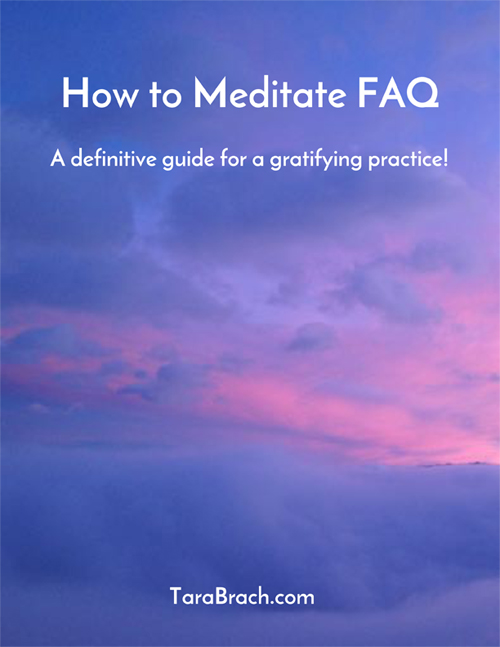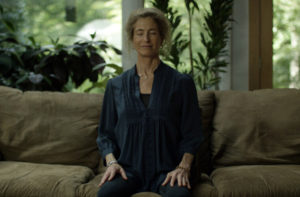In moments of desperation, no matter what we believe, we all tend to reach out in prayer to something or someone for help. We might call out for relief from a migraine, beg to be selected for a job, pray for the wisdom to guide our child through a difficult time. Maybe we whisper, “Oh please, oh please,” and feel that we are asking “the universe” for help. When we feel disconnected and afraid, we long for the comfort and peace that come from belonging to something larger and more powerful. But who exactly are we praying to?
I grew up Unitarian, and I remember how we used to joke about addressing our prayers “To Whom It May Concern.” This same question may come up for those of us who follow the path of the Buddha. Students of Buddhist practice usually think of praying as peculiar to Christianity and other God-centered religions. Beseeching someone or something greater than our small and frightened self seems to reinforce the notion of a separate and wanting self. Yet while prayer does suggest a dualism of self and other, in my experience when we fully inhabit our longing, it can carry us to the tender and compassionate presence that is our own awakened nature.
Some years ago I was suffering from a broken heart. I had fallen in love with a man who lived 2000 miles away, on the other side of the country. Because we had very different desires about having a family and about where to live, we couldn’t weave our lives together and the relationship ended. The loss was crushing—for many weeks I was swamped in obsessing about him, sobbing, overwhelmed with grief. I stopped listening to the radio because classic rock songs often left me weeping. I avoided romantic movies. I barely talked with friends about him because even saying his name out loud would freshly reopen the wound.
I accepted my grieving process for the first month or so, but as it went on and on, I started feeling ashamed of how big and dominating my sense of desolation was. On top of that, I felt that something must be wrong with me for being such an emotional wreck. The man was moving on, dating other people. Why couldn’t I do the same? I tried to wake up out of the stories, I tried mindfully letting the pain pass through, but I remained possessed by feelings of longing and loss. I felt more excruciatingly lonely than I had ever felt in my life.
In the room where I meditate, I have a Tibetan scroll painting (called a thanka) of the bodhisattva of compassion. Known as Tara in Tibet and Kwan Yin in China, she is an embodiment of healing and compassion. It is said that Kwan Yin hears the cries of this suffering world and responds with the quivering of her heart. One morning, about a month into my meltdown, as I sat crying in front of the thanka, I found myself praying to Kwan Yin. I felt crushed and worthless. Rilke’s words resonated deeply:
I yearn to be held in the great hands of your heart—Oh let them take me now. Into them I place these fragments, my life…
I wanted to be held in Kwan Yin’s compassionate embrace.
For a few days I prayed to Kwan Yin and did find some comfort in sensing her presence. But one morning I hit a wall. What was I doing? My ongoing ritual of aching and praying and crying and hating my suffering was not really moving me towards healing. Kwan Yin suddenly seemed like an idea I had conjured up to soothe myself. Yet without having her as a refuge, I now had absolutely nowhere to turn, nothing to hold on to, no way out of the empty hole of pain. What felt most excruciating was that the suffering seemed endless and without purpose.
Even though it seemed like just another idealistic notion, I remembered that at times in my Buddhist practice, I had experienced suffering as the gateway to awakening the heart. I remembered that when I had remained present with pain in the past, something had indeed changed I opened to a more spacious and kind awareness. Suddenly I realized that maybe I needed to stop fighting my grief and loneliness, no matter how horrible I was feeling or for how long it continued. Only by experiencing the pain fully could I deliver “these fragments, my life” into Kwan Yin’s boundless compassion.
I recalled the bodhisattva’s aspiration: “May this suffering serve to awaken compassion” and began quietly whispering it inside. As I repeated the prayer over and over, I could feel my inner voice grow less desperate, more sincere. I was praying not for relief, but for the healing and freedom that naturally unfolds as we open to the bruised and broken places inside us. The moment I prayerfully let go into that depth of suffering, the change began. Now I could scarcely bear the searing pain of separation. I was longing, not for a particular person but for love itself. I was longing to belong to something larger than my lonely self. The more fully I reached inward to the gnawing emptiness, instead of resisting or fighting it, the more deeply I opened to my yearning for the Beloved. As I let go into that yearning, the sweet presence of compassion arose. I distinctly sensed Kwan Yin as a radiant field of compassion surrounding me, cherishing my hurting, vulnerable being. As I surrendered into her presence, my body began to fill with light. I was vibrating with a love that embraced the whole of this living world—it embraced my moving breath, the singing of birds, the wetness of tears and the endless sky. Dissolving into that warm and shining immensity, I no longer felt any distinction between my heart and the heart of Kwan Yin. All that was left was an enormous tenderness tinged with sadness. The compassionate Beloved I had been reaching for “out there” was my own awakened being.
See Praying from Presence – part 2 – Praying from Presence – Part 2…
For more information visit: http://www.tarabrach.com/
Photo Credit: Shell Fischer


